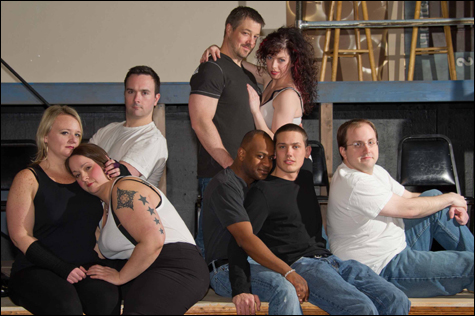
FAMILIAL CLOSENESS The cast of Rent at Lyric Music Theater. |
A great affection remains among audiences for Rent, Jonathan Larson's 1994 rock opera based on Puccini's La Bohème — it has toured the world several times over, and is slated for an Off-Broadway revival this summer. Its key attraction is its life-affirming spirit, which is a palpable force in our most recent local production, at Lyric Music Theater, in South Portland. Under the direction of Michael Donovan, a very ardent cast with some excellent voices enacts the interlinked stories of struggling young filmmaker Mark and his boho friends in New York City.
Mark (Jason Phillips) squats in a heatless former publishing-house building with his buddies Roger (Chris Austin) and Tom Collins (Thomas Jerome Smallwood), a gay, anarchist computer professor. Both are HIV-positive, and among their creative, edgy cohort, AIDS is not a specter so much as a presence right at the table — Roger's girlfriend killed herself after her diagnosis, and friends are dying. Also positive are Mimi (Celeste Green), an exotic dancer and Roger's new love interest, and Angel (Tyler Beck), a drag queen and the new lover of Tom. Rounding out the main players are Mark's ex-girlfriend Maureen (Jennifer Miller), a bisexual performance artist diva who, with her Ivy-educated Legal Aid girlfriend Joanne (Rebecca Rinaldi), rages against Benny (Brian McAloon), their former friend who married into real estate, now charges everyone rent, and wants to develop the tent-city lot next door.
There's great energy and feeling among the cast, which does well in conveying the sense of familial closeness of this rag-tag community. As Mark, the documenting eyes of the group, Phillips has a strong voice and a low-drama affability that befits the observer of the bunch, and Austin, as his roommate Roger, does nice work opening the man's angst and anger to love. Smallwood is a giddy, sonorous buddha as Tom and a delight, especially in the professor's whimsical musical dream of opening a restaurant far away in Santa Fe; he's also a spectacular dancer, and in that sense was underused in this show. As Tom's love interest Angel, Beck has a nice ethereal, weirdo sweetness, though he could use some more practice dancing in heels. The women lovers Joanne and Maureen have a particularly good, touchy rapport (and a great duet belting it out), and Green as Mimi has the most fully developed arc in the show, progressing as she does from a Joan Jett-infused bad girl to a weeping waif on her last legs.
Everyone ranges over a multi-level set, meant to evoke the precarious, stripped-down rubble in which they negotiate their lives. Don Smith's set, a collage of planks and plywood, gets across their setting's dun squalor, though its visual reference to its dynamism — a sort of helix shrine of old bicycle parts, Christmas lights, and interesting cast-off junk — seems a little too far upstage. This show also makes periodic use of projections, whereby Mark's footage is shown. I'm not sure I agree with the decision to screen footage of what is actually going on onstage, which is to say, lots of people singing, as opposed to what's going on in their regular neighborhood lives, which would presumably be a lot less songful, but the projections are at some times used movingly and to interesting visual effect. Near the beginning, Roger's solo puts him up close in front of the screen, in near-crucifixion pose and half covered in the huge face of his dead girlfriend.